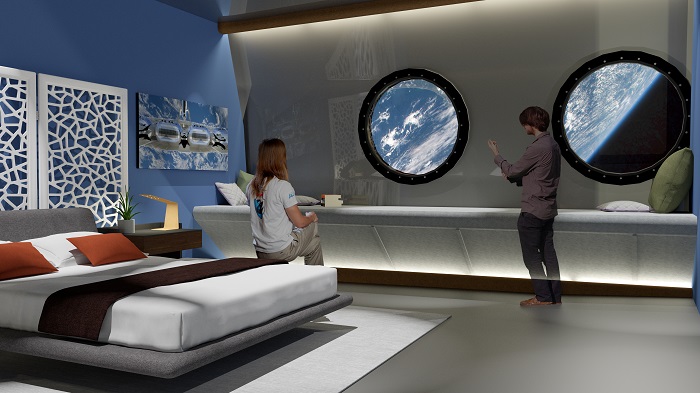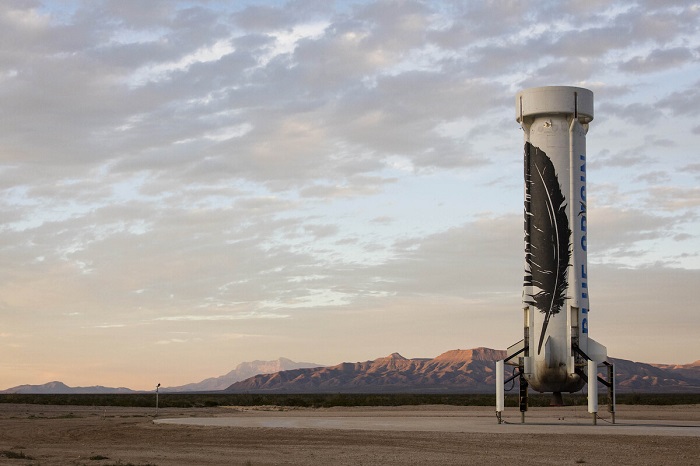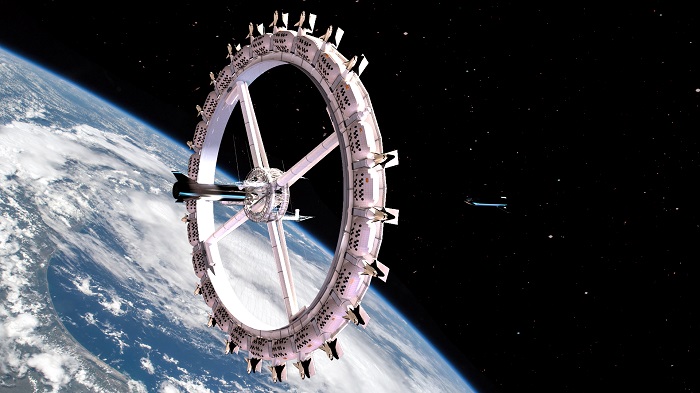ISABEL RUBIO ARROYO | Tungsteno
The facilities—more than 300 rooms, an open-air gym, a Japanese garden, a casino and a concert venue—could be part of any luxury hotel, but will belong to a rather special type of lodging. Voyager Station aims to be the first space hotel that orbits in the stratosphere. Its creators hope to have it up and running by 2027, but taking such a project into space is far from easy. In fact, several similar initiatives have failed in the past. How viable are space hotels?
On 12 April 1961, Yuri Gagarin became the first human being to travel into space. This historic event kick-started the space race, and in the 60 years since then more than 570 astronauts have made it to space. While government agencies such as NASA and the European Space Agency (ESA) have driven much of the space travel, in recent decades various private companies have taken the first steps to build their own launch vehicles and tourist accommodation.
A new era of space tourism
In recent months, some billionaires have ushered in a new era of space tourism. Virgin Galactic successfully launched its founder, Richard Branson, and three other crewmembers into space in July. A few days later, Amazon founder Jeff Bezos also travelled into space on the first manned trip of his company, Blue Origin. "We're trying to make the public realise that this golden age of space travel is just around the corner. It's coming. It's coming fast," says ex-pilot John Blincow, who runs the Orbital Assembly Corporation.
The company’s flagship project is the Voyager Station hotel, a futuristic rotating wheel orbiting the Earth. The website of this initiative is full of enticing messages such as: "Reserve your place to be one of the first humans to vacation on a luxury space station," or "Make history as one of the first humans in history to own real estate in orbit."

Voyager Station will have more than 300 rooms, an open-air gym, a Japanese garden, a casino and a concert venue. Credit: Orbital Assembly Corporation.
Although the marketing slogans take its success for granted, it is still too early to tell whether this ambitious initiative will ever become a reality. In fact, most projects of this kind have either failed or have not yet come to fruition. In 2008, a total of 38 people had already made reservations to stay at the Galactic Suite space resort, which at the time aspired to be the first space hotel. The trip itself was to cost each of them around three million euros and, in addition to the four-day stay, would include 18 weeks of preparation on a Caribbean island.
The Galactic Suite was supposed to be ready in 2012. But it wasn't. The hotel, which was to have a spa and orbit 450 kilometres above the surface, never made it into space. Today the company's website is practically inoperative and its social networks have not been updated for several years. On its YouTube channel the last videos were shared nine years ago and on Facebook the most recent post dates back to 2017.
Maintaining a hotel in space is a real financial challenge
There are a number of significant hurdles to be overcome in setting up such a hotel. Getting a hotel into space can involve exorbitant amounts of money. For example, the development, assembly and 10-year operation of the International Space Station cost 100 billion euros, according to the European Space Agency. Major world powers such as the United States, Russia, Canada, Canada, Japan and 10 European nations that are part of ESA were involved in funding this project.
Some proponents of such projects say the growing success of commercial aerospace companies like SpaceX has made launch options more affordable. But Gary Kitmacher, who works for NASA, stresses that it is not just the cost of designing and maintaining the hotel in orbit that needs to be covered. There would also be "the cost associated with taking the paying passengers, the tourists, up and back."

In addition to the cost of maintaining a hotel in orbit, there is the cost of getting tourists to space and back to Earth. Credit: Blue Origin.
The health risks of flying into space
Adding to the cost of space travel are other challenges. "The real concern is to design the habitat—the pressurised module that you're going to be living in—so that it can handle the temperature changes," Kitmacher told space news website Space.com. Temperatures in space vary from extreme heat to extreme cold, depending on whether astronauts are in direct sunlight or darkness.
In addition, if an Earth-orbiting hotel were to be launched, it would have to have its own employees. But it should be noted that spending long periods of time in space can have detrimental effects on health, from circadian rhythm disorders (the physical, mental and behavioural changes throughout the day) to loss of muscle mass or calcium.
A person in space can lose between 1% and 1.5% of their bone mass in just one month, according to NASA. In addition, two-thirds of astronauts who spend a long time in space return with vision problems. A study presented in 2016 at the annual meeting of the American Society of Radiology indicates that the problem is due to changes in cerebrospinal fluid due to the lack of gravity.
Timothy Alatorre, one of the architects of Voyager Station, believes the inspiration behind some of these projects comes from "watching science fiction over the last 50 years and seeing how mankind has had this dream of starship culture." "I think it really started with Star Trek and then Star Wars and this concept of large groups of people living in space and having their own commerce, their own industry and their own culture," he says. For the time being, it looks like we will have to wait before we are able to live or vacation in space. To achieve this, space hotels will have to overcome all the hurdles to get them up and running.
· — —
Tungsteno is a journalism laboratory to scan the essence of innovation. Devised by Materia Publicaciones Científicas for Sacyr’s blog.
